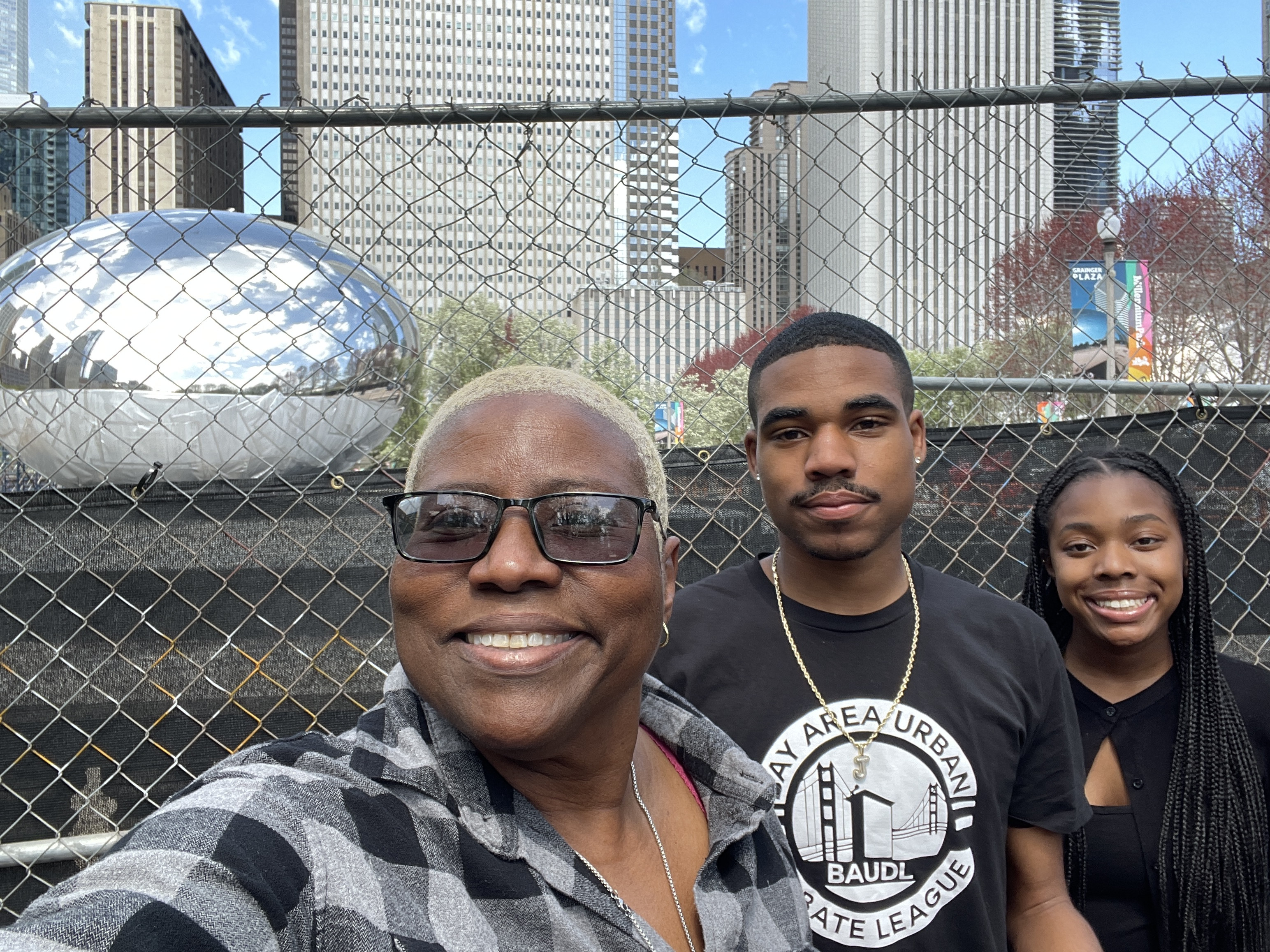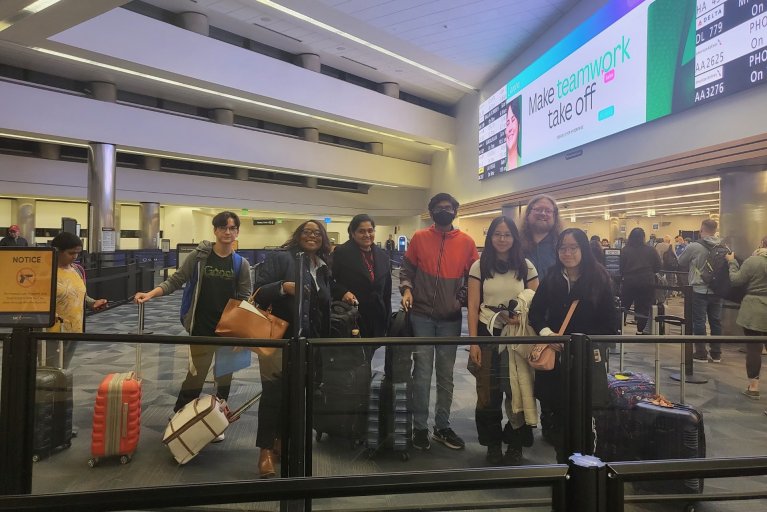Apr 24, 2024 At 01:39 PM EDT
In the halls of Emery High School in Emeryville, California, the students know not to argue with Ms. Crichlow.
"Which is silly because I'm not actually a debater, but they perceive that I am," she said.
Jessica Wright-Crichlow, 59, has been a teacher for nearly two decades and has been the debate coach at Emery High School since 2013. Born in Panama and raised in California's Bay Area, she earned a business and accounting degree in college but admits she "didn't really want to work with numbers."
She bounced between different jobs and eventually was working as a delivery driver at the airport for FedEx. After getting injured on the job, she stopped working for a while. Eventually, she decided to become a teacher.
This year, Wright-Crichlow was named the 2024 Coach of the Year by the National Association for Urban Debate Leagues (NAUDL), the first coach from the Bay Area Urban Debate League (BAUDL) to receive this honor.
"People keep saying, 'Congratulations, congratulations,' [but] I don't know if it's soaked in yet," she said.
This award is a "great honor," Wright-Crichlow said, adding that she is proud to represent BAUDL and her school in this way. But this distinction pales in comparison to how she feels every day seeing her students succeed.
"When my students say, 'Thank you for being there,' or 'I understand what you're trying to say, you're right,' that, to me, is more important than Coach of the Year," she said.
Congratulations to this year's Coach of the Year: Jessica Wright-Crichlow from the @BAUDL. She's been coaching @EmeryHigh since 2013 🎉 pic.twitter.com/AOmLw2GnC9
— NAUDL (@NAUDL1) March 26, 2024
Eleven years ago, a representative from BAUDL came to Emery High School looking to start a debate program there. At the time, Wright-Crichlow had no previous debate experience but she decided to sign up as a support staff member for the team. But when the coach quit after about half a season, Wright-Crichlow said she'd take over.
She was teaching Spanish at the time and recruited students from her class to join the team for extra credit. Students showed up and stayed.
At first, Wright-Crichlow taught straight from the workbook BAUDL provided and learned more about debate from the six workshops BAUDL held for new coaches. The league also provided mentors who would come to the school to start up new debate teams and help run practices.
"[BAUDL] has helped me immensely," Wright-Crichlow said. "They help with everything, and not just me—they help everyone."
From the start, she told her debaters that she does not come from a debate background, noting that she's not going to teach them all of the policy debate lingo because she doesn't understand it herself.
"I would tell them right off the bat, I don't know what debate is, I don't know how to debate [but] I will listen as a layperson, and I will tell you what sounds good to me as an educated person who can understand what you're trying to say and what you're trying to convey," she said.
While she isn't a debater herself Wright-Crichlow's strength as a coach lies in her ability to motivate her students. She says she can relate to some of her student's fears and anxieties as someone who is afraid of public speaking.
"I'm a motivator, I have words to give you to motivate you and tell you you can do this, whether or not you can do it," she said. "I can say, 'I understand where you're coming from, and you have to push through [because] you can do it.'"
Her students, however, would say her wisdom and support make her exceptional.
"Ms. Crichlow is a great coach and also a great person," Jordan King, a junior at Emery, told Newsweek. "A lot of people just get coaches, but with Ms. Crichlow, you get a coach and a friend [and] a parent. I trust her with things, and you can talk to her about anything. She's there for all of her debaters and not just for debate, but for all things."

As a Spanish and technology teacher at Emery, Wright-Crichlow also finds ways to keep students on track outside of debate.
"Our school is so small that I know every single person by name," she said. "And I can use what I know about them personally to push them in the right direction."
Every debater Wright-Crichlow coaches is different, she said. For example, one of her first debaters was shy and "finally came out of her shell" while another was "more outspoken and angry-seeming." With each new class of students, she is challenged to find how to best guide them to success.
"For every single debater, I have to find what motivates them to keep them from throwing up before a tournament or give them the words they need to go out there and say, 'I can do this,'" she said.
To accommodate each debater, Wright-Crichlow said she talks to the adults in their lives. She coordinates with other coaches when practices overlap and checks in on teachers to monitor her debaters' grades, and intervenes if they need extra help or a tutor.
Clacy Watkins is a junior and second-year debater at Emery. She said Wright-Crichlow doesn't just care about debate, she cares about the students as people.
"She will come into practice and be like, 'What's up with this grade here? Why are you failing? Why is this a C? You need to improve this,'" Watkins said. "She's always checking our grades."
She said Wright-Crichlow asks students about what else they have going on outside of school, including other extracurriculars, jobs and where they want to go to college.
"She's always asking and giving us information," Watkins said. "We can always come to her with questions [and] she'll give you really wise advice."
Watkins said the Emery team feels like a family. At her previous school, Watkins said she was going to debate but didn't fit in with the team. Coming to Emery was a very different experience.
"Ms. Crichlow's like a mom to me, she's so supportive," she said. "I really like debate, and I really like having her as a debate coach. She's super-cool."
In her 11 years coaching debate, Wright-Crichlow said the experience has given her a lot of confidence. She went from teaching Spanish to starting a new classroom where she teaches digital photography, ASL and computer science. Wright-Crichlow said debate has made her want to continue to "learn as I go," and she hopes the same for her students.
"I want them to be lifelong learners [and] take change as it comes, as opposed to fight change or be afraid of change," she said. "Because life changes every day—you wake up tomorrow and you have to get a new job, you wake up Tuesday and you got fired or laid off because your company is downsizing. So instead of sitting at home and wallowing, take it as change, move on and wake up and say, 'I'm gonna go out and do something else.'"
In debate, students face failure and change each round. They don't know what their opponents will argue and have to adjust on the spot in cross-examination and during their speeches.
Students constantly face defeat and must brush it off quickly to prepare for the next round against a new team. Debaters must learn from their losses, absorb those lessons and feedback from judges and move on—which can difficult for anyone to learn at any age, let alone teenagers.
Jordan King said Wright-Crichlow shows her debaters that the activity isn't always about winning and losing, "it's about becoming better and becoming educated."
"I see debate as education and learning about what goes on in the outside world that I don't get from regular school," he said. "If I didn't do debate, I wouldn't be as outspoken as I am now. That's a big impact of debate—to become outspoken, and spread my voice, especially as a person of color, as a Black man. There's not many of us in debate."

For Wright-Crichlow, it is the connections made in BAUDL that make her time and effort worth it. She said she's seen students grow from debaters to coaches and administrators working for the league and giving back to the Bay Area debate community.
Over the past decade, Wright-Crichlow has seen the BAUDL family grow as new schools are added and debaters grow up and remain part of the community. The current BAUDL staff member assigned to her school is actually a former debater who competed at the Urban Debate National Championship twice.
Wright-Crichlow's own children have also joined the BAUDL community after years of tagging along with her at tournaments. One of her sons even worked with BAUDL to start a team at his school. That drive and passion, she said, makes her "a proud mom."
"My kids are in middle school and they were like, 'I want to learn how to debate.' It helps them," she said. "I have an autistic kid who debates, and it helps him because he's a nonverbal person, so it helps him speak."
For over a decade, Wright-Crichlow has worked with many students with various personalities and debate styles.
"What I've taken away is that I have to see every [student] individually," she said. "They are individual people with individual backgrounds that they bring to the debate round and express differently."
Attending to each of their specific needs can be a challenge, one that requires immense patience, Wright-Crichlow said.
"I'm not a very patient person, but [coaching debate] takes patience and kindness and you have to be calm at all times," she said. "They push a lot of buttons."
Wright-Crichlow added that it is sometimes difficult to schedule time around the students' busy schedules and keep them focused in practices.
"They want to hang out with their friends," she said. "The fact that when we start practice, the first 20 minutes, they're eating—there are so many things where I have to be like, 'Dude, we have to work, you guys can't go to Wingstop.'"
But as she's helped her students learn and grow in and out of debate, Wright-Crichlow credits the students for inspiring her to keep coaching.
"The years went by and every year I would say, 'I'm not doing this anymore, this is a lot of Saturdays away from my kids, and I don't want to do this anymore,'" she said. "And every time that would happen, a new debater with the will to stay would come in. And so I was like, 'Wow, all right, if they want to stay, I have to stay.'"








